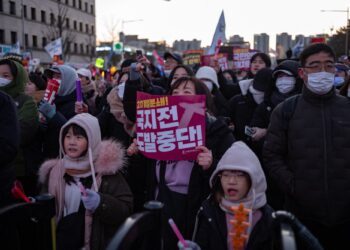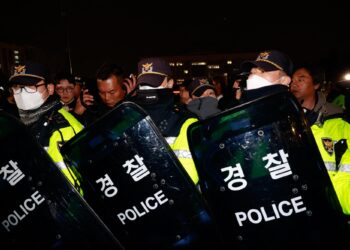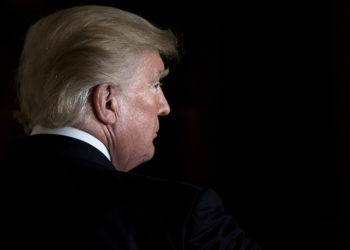“Yes, We Did.” These were final words of Unites States President Barack Obama, capping his eight-year presidency in an emotional farewell address in his hometown Chicago, where he first started his political journey.
The outgoing president used these words to highlight his achievements as the nation’s first black president, who came to the White House with this promise: Yes, We Can. Leaving the White House with one of the highest approval ratings — unusual for outgoing presidents — President Obama’s supporters fear that his legacy, particularly his signature healthcare law, is under threat due to the incoming administration.
In his 51-minute speech at the McCormick Place Convention Center in Chicago on Tuesday before an enthusiastic and emotional audience, Mr. Obama was proud of his administration’s achievements but warned against actions that would put American democracy in peril.
Mr. Obama acknowledged the progress that has been made during his eight years in office, contextualizing these accomplishments within the long tradition of the American democratic experiment. He highlighted the reversal of the financial crisis under his presidency — the revitalization of the American auto industry, the legalization of same-sex marriage, and the passing of the Affordable Care Act — which extended health insurance to 20 million previously uninsured Americans — as some of his administration’s most significant domestic achievements.
Speaking of his administration’s greatest achievements in foreign policy, Mr. Obama mentioned the reconciliation with Cuba, the nuclear deal with Iran, and killing of al-Qaeda leader Osama bin Laden. He also highlighted the U.S. role in the Paris Agreement that regulates carbon emissions to control the climate change. It is not clear to what degree the incoming Donald J. Trump administration will reverse progress in climate change. Mr. Trump’s pick to lead EPA is a climate change skeptic while his nominee for the State Department was the CEO of Exxon Mobil.
Mr. Obama hailed the country’s leading role in the global coalition against ISIS, which he said “has taken out their leaders and taken away about half their territory.”
Mr. Obama spent a significant amount of his speech discussing what he regards as the three greatest threats to the American democracy: economic inequality, racial divisiveness, and apathy and cynicism among American citizens.
He suggested that the remedy for economic inequality depends upon fixing the education system, improving workers’ rights, updating the social safety net and reforming the tax code to redistribute wealth that has become highly concentrated in the hands of the “corporations and the individuals who reap the most from this new economy.”
Regarding American race relations, Mr. Obama stated that while much progress has been made in recent years, “race remains a potent and often divisive force in our society.” Obama acknowledged that America is becoming an increasingly diverse nation, and suggested that it is necessary to “invest in the children of immigrants.” In a subtle swipe at Mr. Trump, he asserted that democracy is weakened “when we define some of us as more American than others.”
The final threat to democracy, Mr. Obama said, occurs whenever the American people “take [democracy] for granted.” He said all Americans, regardless of their party affiliation, should engage in rebuilding their democratic institutions. Quoting from George Washington’s farewell address, Mr. Obama urged each American citizen to guard American democracy, and the spirit of cooperation among people of differing positions and opinions which underpins it, with a “jealous anxiety.”
Throughout his address, Mr. Obama continually returned to the theme of citizen participation in the government, which he referred to as “our nation’s call to citizenship.” The participation of ordinary citizens, Mr. Obama said, is a crucial component of democracy as well as the reason for the progress made during his two presidential terms.
Mr. Obama used the word “democracy” 20 times in his speech, more than 15 previous presidents combined. George W. Bush used only 3 times while Bill Clinton did not even mention democracy during his farewell address.
Mr. Obama said that as a young man working in Chicago, he “learned that change only happens when ordinary people get involved.” He said getting engaged as a citizen is “the beating heart of our American idea.”
Mr. Obama carried both elections in 2008 and 2012 thanks to young volunteers and voters that constituted most of the electorate of Sen. Bernie Sanders, who also ran for White House in 2016.
He expressed his confidence in the younger generation to carry on this work, characterizing the youth as “unselfish, altruistic, creative, patriotic.”
The address ended on an emotional note, with the president pausing to wipe away tears as he spoke of Michelle Obama’s accomplishments as First Lady. “My fellow Americans, it has been the honor of my life to serve you,” said Mr. Obama, and in a closing statement that echoed the slogan of his presidential campaign, he declared, “yes we can. Yes we did. Yes we can.”





















